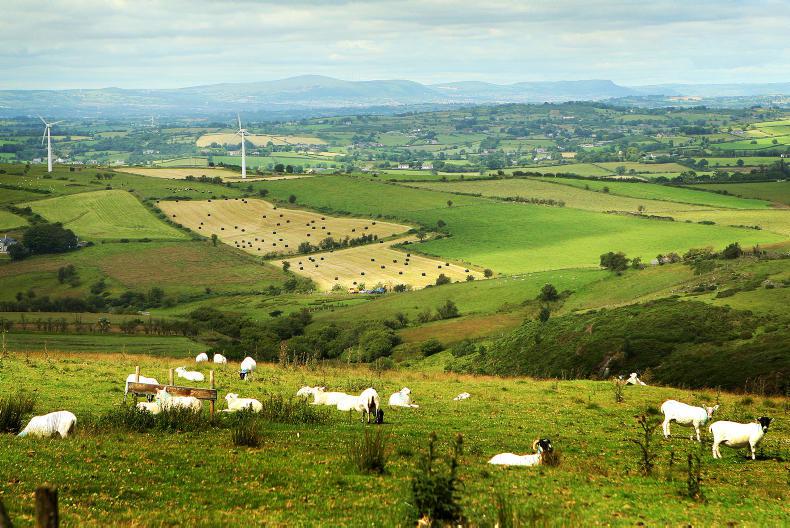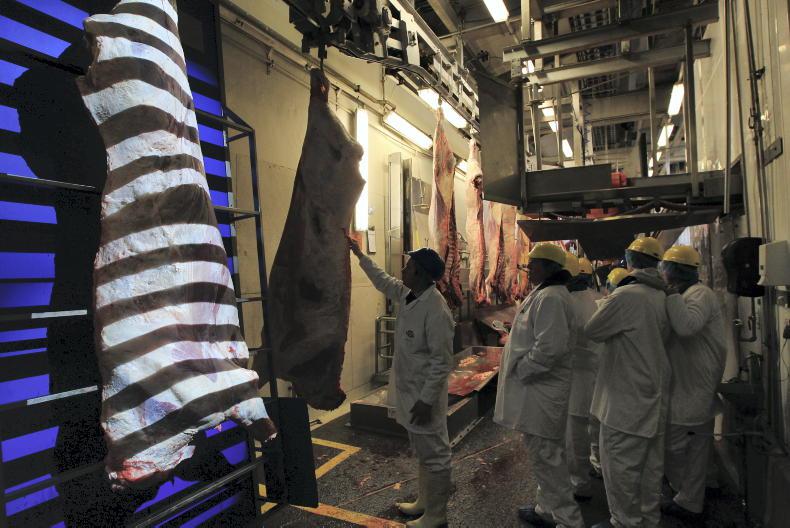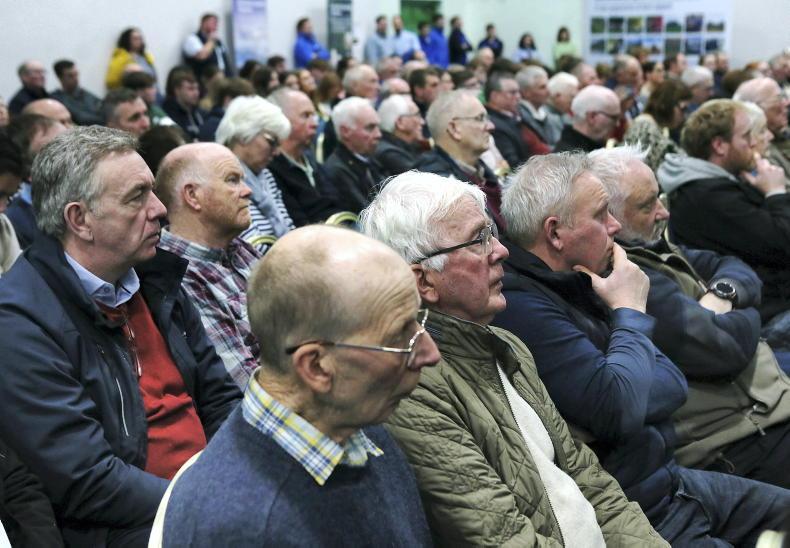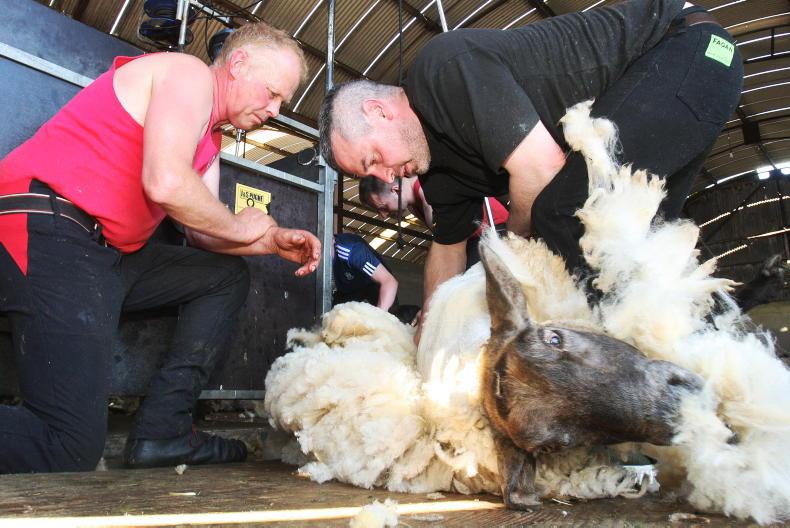Various proposals that could be part of a future support system for NI farmers are to be brought forward this year for consultation by DAERA.
Speaking at the Young Farmers’ Clubs of Ulster (YFCU) agri-food conference last Thursday, DAERA senior official Dr Rosemary Agnew provided some insight into what might lie ahead.
On the budget for farm support, she highlighted the commitment made in the Tory party pre-election manifesto that farm support in cash terms would remain at 2019 levels for the lifetime of the current Parliament (to 2024).
“After that we can’t guarantee anything, but the Department will be looking for the same level of support,” she said.
But longer-term, she acknowledged that the UK Treasury will probably want to see value for money, and public goods delivered.
Agnew said that there are various options to consider
As highlighted in a stakeholder engagement document from August 2018, one firm policy proposal in NI is for a basic resilience payment, paid per hectare, but at much lower levels than current direct payments.
Within that, Agnew said that there are various options to consider, including whether there is a minimum area requirement, the payment is capped, or has different rates dependent on land type.
Productivity
On the potential for coupled payments for suckler cows or breeding ewes (something favoured by Minister Poots), she suggested that it would not be a simple payment per head. Instead, it could be linked to productivity, and potentially a minimum and maximum stocking density, or dependent on the age at first calving, calving interval, or genetics of the animal.
“These are things the Minister wants to consider,” she said.
However, as well as increased productivity and improved resilience, the stakeholder engagement document from 2018 also highlights the need for the industry to be environmentally sustainable.
While only briefly touching on the subject, Agnew said the Department recognised that a new approach was required, that made participating in an agri-environment scheme “a profit centre” for farmers.
Everything is on the table going forward
She also suggested that DAERA will want to “come back and explore” a proposal set out in a DAERA education strategy from 2017 which suggested that by 2025 anyone taking over as head of a farm business should have at least a Level 3 qualification in a relevant subject.
Linked to that could be wider measures to support and encourage young farmers, such as incentives built into grant schemes. It is also possible that the DAERA Minister will push again for tax relief for landowners to encourage long-term leasing of land.
“Everything is on the table going forward,” claimed Agnew.
DAERA to review active farmer rules
The rules around what constitutes an “active farmer” are part of an internal review within DAERA, Rosemary Agnew told attendees at the YFCU conference last Thursday.
Currently defined as the “person having decision-making power, benefits and financial risks” in relation to the farming activity on a parcel of claimed land, the rules have been in place since 2015.
“The Minister [Edwin Poots] wants to review current active farmer policy to bring in a new policy for 2022” Agnew said last week.
While the introduction of active farmer rules was a major factor in the number of payment claimants dropping from over 37,000 in 2013 to 26,500 in 2015, and around 24,500 now, the reality is that many landlords still benefit indirectly from the system.
The non-active farmer won’t invest in outcomes
It is a point made by UFU President Victor Chestnutt at the YFCU conference.
“We reckon that up to 50% of the money is not targeted at people who are producing, and that is wrong,” he suggested.
It is one of the reasons why he would favour a new long-term approach where in addition to a basic resilience payment (available to all farmers) there would be targeted, outcome based schemes.
“The non-active farmer won’t invest in outcomes. It cuts them out. We all know that money is currently going to people who are not taking the industry forward,” he said.
Chestnutt described specific ideas for schemes from the UFU as “still in the melting pot”.
Read more
UFU doesn’t want English payment approach
Tier 1 budget doubled to £15m
Various proposals that could be part of a future support system for NI farmers are to be brought forward this year for consultation by DAERA.
Speaking at the Young Farmers’ Clubs of Ulster (YFCU) agri-food conference last Thursday, DAERA senior official Dr Rosemary Agnew provided some insight into what might lie ahead.
On the budget for farm support, she highlighted the commitment made in the Tory party pre-election manifesto that farm support in cash terms would remain at 2019 levels for the lifetime of the current Parliament (to 2024).
“After that we can’t guarantee anything, but the Department will be looking for the same level of support,” she said.
But longer-term, she acknowledged that the UK Treasury will probably want to see value for money, and public goods delivered.
Agnew said that there are various options to consider
As highlighted in a stakeholder engagement document from August 2018, one firm policy proposal in NI is for a basic resilience payment, paid per hectare, but at much lower levels than current direct payments.
Within that, Agnew said that there are various options to consider, including whether there is a minimum area requirement, the payment is capped, or has different rates dependent on land type.
Productivity
On the potential for coupled payments for suckler cows or breeding ewes (something favoured by Minister Poots), she suggested that it would not be a simple payment per head. Instead, it could be linked to productivity, and potentially a minimum and maximum stocking density, or dependent on the age at first calving, calving interval, or genetics of the animal.
“These are things the Minister wants to consider,” she said.
However, as well as increased productivity and improved resilience, the stakeholder engagement document from 2018 also highlights the need for the industry to be environmentally sustainable.
While only briefly touching on the subject, Agnew said the Department recognised that a new approach was required, that made participating in an agri-environment scheme “a profit centre” for farmers.
Everything is on the table going forward
She also suggested that DAERA will want to “come back and explore” a proposal set out in a DAERA education strategy from 2017 which suggested that by 2025 anyone taking over as head of a farm business should have at least a Level 3 qualification in a relevant subject.
Linked to that could be wider measures to support and encourage young farmers, such as incentives built into grant schemes. It is also possible that the DAERA Minister will push again for tax relief for landowners to encourage long-term leasing of land.
“Everything is on the table going forward,” claimed Agnew.
DAERA to review active farmer rules
The rules around what constitutes an “active farmer” are part of an internal review within DAERA, Rosemary Agnew told attendees at the YFCU conference last Thursday.
Currently defined as the “person having decision-making power, benefits and financial risks” in relation to the farming activity on a parcel of claimed land, the rules have been in place since 2015.
“The Minister [Edwin Poots] wants to review current active farmer policy to bring in a new policy for 2022” Agnew said last week.
While the introduction of active farmer rules was a major factor in the number of payment claimants dropping from over 37,000 in 2013 to 26,500 in 2015, and around 24,500 now, the reality is that many landlords still benefit indirectly from the system.
The non-active farmer won’t invest in outcomes
It is a point made by UFU President Victor Chestnutt at the YFCU conference.
“We reckon that up to 50% of the money is not targeted at people who are producing, and that is wrong,” he suggested.
It is one of the reasons why he would favour a new long-term approach where in addition to a basic resilience payment (available to all farmers) there would be targeted, outcome based schemes.
“The non-active farmer won’t invest in outcomes. It cuts them out. We all know that money is currently going to people who are not taking the industry forward,” he said.
Chestnutt described specific ideas for schemes from the UFU as “still in the melting pot”.
Read more
UFU doesn’t want English payment approach
Tier 1 budget doubled to £15m










SHARING OPTIONS